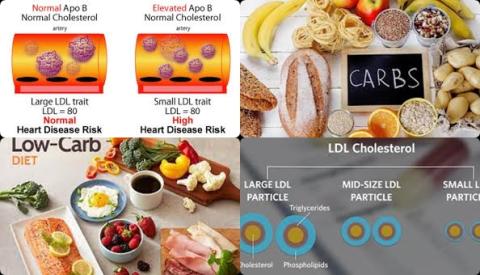
Objectives:
LDL particle size and number (LDL-P) are emerging lipid risk factors. Nonsystematic reviews have suggested that diets lower in carbohydrates and higher in fats may result in increased LDL particle size when compared with higher-carbohydrate diets. Therefore, this review article has been conducted.
Do dietary interventions restricted in carbohydrates increase LDL peak particle size and decrease the numbers of total and small LDL particles?
Study design:
This review article included 38 randomized trials (of any length that reported on dietary carbohydrate restriction (intervention) compared with higher carbohydrate intake (control)) with a total of 1,785 participants.
Results and conclusions:
The investigators found dietary carbohydrate restriction were significantly associated with an increase in LDL peak particle size [SMD = 0.50, 95% CI = 0.15 to 0.86, p 0.01] and a reduction in LDL particle number [SMD = -0.24, 95% CI = -0.43 to -0.06, p = 0.02], when compared with higher carbohydrate intake.
The investigators found the effect of carbohydrate-restricted dietary interventions on LDL peak particle size appeared to be partially explained by differences in weight loss between intervention groups and exploratory analysis revealed a shift from small dense to larger LDL subclasses.
The investigators found no statistically significant association between carbohydrate-restricted dietary interventions and mean LDL particle size [SMD = 0.20, 95% CI = -0.29 to 0.69, p = 0.37], when compared with higher carbohydrate intake.
The investigators concluded that dietary interventions restricted in carbohydrates increase LDL peak particle size and decrease the numbers of total and small LDL particles.
Original title:
Effect of carbohydrate-restricted dietary interventions on LDL particle size and number in adults in the context of weight loss or weight maintenance: a systematic review and meta-analysis by Falkenhain K, Roach LA, […], Little JP.
Link:
https://pubmed.ncbi.nlm.nih.gov/34159352/
Additional information of El Mondo:
Find more information/studies on cholesterol and cardiovascular disease right here.
LDL particle number (LDL-P) is a much more accurate predictor of cardiovascular disease risk than either LDL or total cholesterol. Increased LDL-P could be one of the reasons that some people have heart attacks even though their total cholesterol and LDL cholesterol levels are not particularly high.
A low-carbohydrate diet is a diet with 20-40 En% carbohydrate. The easiest way to follow a diet with 20-40 En% carbohydrate is to choose only meals/products with 20-40 En% carbohydrate. Check here which products contain 20-40 En% carbohydrate.
However, the most practical way to follow a diet with 20-40 En% carbohydrate is, all meals/products that you eat on a daily basis should on average contain 20-40 En% carbohydrate.
20-40 En% carbohydrate means that the total amounts of carbohydrates make up for a 20-40% of the total kcal of the diet.
Use the 7-points nutritional profile app to see if your daily eaten products contain on average 20-40 En% carbohydrate.